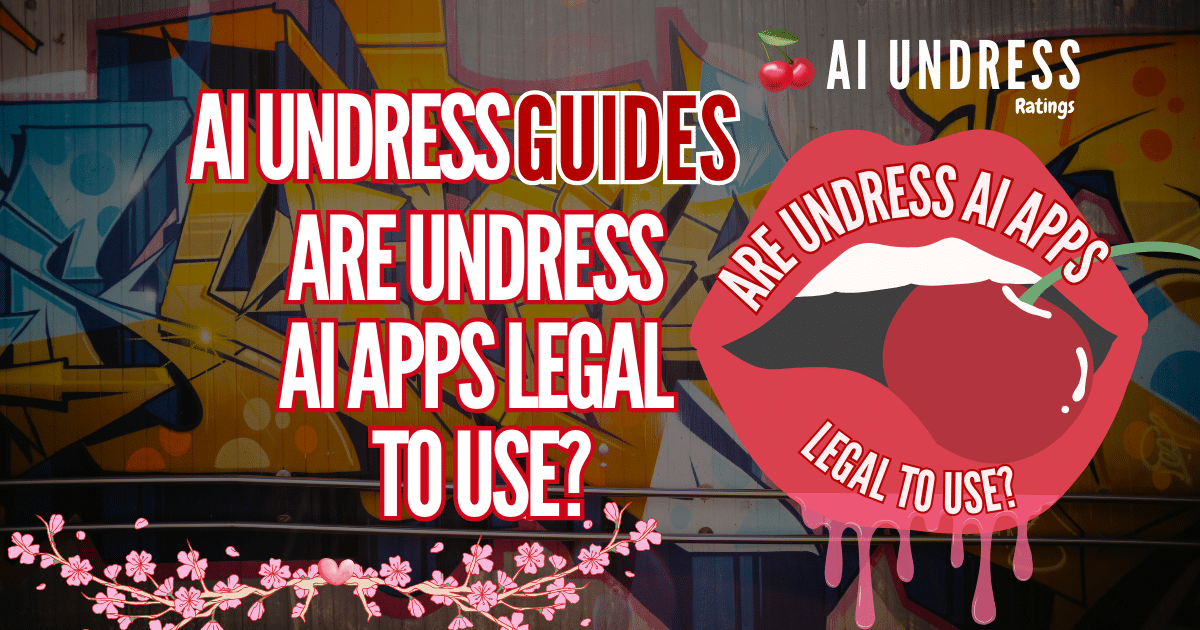Undress AI apps have exploded in popularity – fueled by big curiosity, controversy, and a wave of viral TikToks and Reddit threads. With just a single uploaded photo, these tools promise to digitally “undress” someone using AI. Sounds awesome? It is. But it’s also a legal minefield.
As these apps become more popular, questions are coming fast: Is this legal? What if it’s just for fun? Can I use it on my own photo – or someone else’s? And more importantly: What are the actual legal consequences if I do?
In a world where deepfake laws are still catching up and consent-based tech is murky at best, understanding the legal boundaries around Undress AI isn’t just smart – it’s essential. This super guide from Mike (itz me) breaks it all down so you don’t get caught off guard.
So what Is an Undress AI App?
An Undress AI app is a tool that uses AI to remove clothing from images. The goal? To generate a fake, nude version of the person in the photo. While some are marketed as “fun”, many of these tools target NSFW (Not Safe for Work) use cases and operate in legal grey areas.

While the technology might seem impressive or even harmless to some users, it poses serious concerns around consent, privacy, data usage, and of course – legality. Many of these apps lack transparency on where your images go, how they’re processed, or if they’re stored and reused for AI training later on.
Understanding what these apps are (and how they operate) is the first step toward making smart and legal decisions about using them.
For a full walkthrough on how this tech actually works in practice, see our hands-on guide on how to use Undress.cc step-by-step — it breaks it all down for beginners.
Reasons You Need to Understand Their Legality
At first look, Undress AI apps might seem like just another edgy internet thing. But once you look beneath the surface, it becomes clear: these tools can get you into serious legal trouble- fast. The laws around AI content are still evolving, which makes it easy to assume something is legal when it’s not.
Here’s why understanding the legal risks is absolutely crucial:
- You could be breaking privacy or harassment laws without realizing it
- Generating fake nudes of someone without consent is illegal in many countries
- Even using your own image could violate an app’s shady terms of service
- Some apps secretly store or share your uploads with third parties
- Legal consequences include lawsuits, criminal charges, and reputational damage
Knowing the risks doesn’t just protect you – it also helps you make more ethical, informed decisions in a space that’s constantly pushing boundaries. And that’s exactly what the next sections will guide you through.
Is It Legal to Use Undress AI Apps?
The short answer? It depends – but in many cases, it’s not.
Undress AI apps exist in a complicated legal zone that mixes privacy rights, consent laws, and emerging legislation around deepfakes and AI media. There’s currently no single, global law that bans these tools outright, but many countries already treat the use of them, especially on images of other people, as a form of non-consensual image abuse or digital harassment.
Here’s the legal breakdown:
- If you use an undress AI app on a photo of someone else without their consent, it’s likely illegal in most countries.
- Even if the image isn’t shared publicly, generating non-consensual fake nudes can violate laws around defamation, harassment, or personal rights.
- Sharing or distributing the edited content massively increases the risk of criminal penalties.
- Using these tools on your own images is often legal, but the app itself might still misuse your data.
In short: legality depends not just on what app you use, but who’s in the photo, where you live, and what you do with the final image.1
For a non-legal perspective on privacy and risks, our guide on is it safe to use Undress AI breaks down real-world use without the legal jargon.
Legal vs. Illegal Use Cases
Because laws vary so much by region and intent, it’s important to understand what separates a “technically allowed” use from one that’s outright illegal – or could land you in serious trouble. Here’s how the line is typically drawn:
✅ Generally Considered Legal:
- Using the app on your own image (as long as the platform doesn’t prohibit it in their Terms of Service)
- Using fictional or AI-generated characters not based on real people
- Keeping content private and not distributing it
🚫 Likely Illegal or Highly Risky:
- Using the app on someone else’s photo without their consent
- Generating content based on celebrities, influencers, or public figures (violates image rights and likeness laws)
- Sharing or publishing the generated images online or via messaging apps
- Creating fake content that could harm someone’s reputation
Even if you don’t mean harm, using these tools on others can trigger real-world legal consequences. Some countries treat these actions the same as digital sexual harassment or deepfake revenge porn – whether or not the final image is “real.”
If you’re unsure about what’s allowed, this Undress.cc review and SugarLab AI Review breaks down how some of the tools are actually used — and where it can go wrong.
How Different Countries Handle Undress AI Legally
Because Undress AI tools often involve deepfake technology and non-consensual nudity, many countries are starting to address them through a mix of new laws, old privacy frameworks, and digital abuse regulations. However, enforcement and clarity vary wildly depending on where you live.
Let’s look at how some key regions are treating the legality of these apps:
United States Laws
The U.S. doesn’t currently have a federal law that bans Undress AI apps specifically, but individual states are stepping up.
- 22+ states have laws against non-consensual deepfakes, especially when sexual in nature.
- California and Virginia have passed specific laws criminalizing the distribution of synthetic nude images without consent.2
- Civil lawsuits are also possible – people can sue for defamation, emotional distress, and invasion of privacy.
- The absence of a clear federal framework makes legal outcomes inconsistent, but risky nonetheless.3
European Union & GDPR
The EU has strong privacy laws under the General Data Protection Regulation, which gives people control over how their personal data, including images, is used.
- Creating undressed versions of real people without consent could be considered illegal data processing.
- The GDPR requires explicit consent to use someone’s image, especially for sensitive content.
- Penalties for violations can be severe, including fines and lawsuits, even if the image was never made public.4
United Kingdom Laws
The UK is taking a firmer stance on deepfakes and image-based abuse:
- The Online Safety Act5 now includes criminal penalties for sharing deepfake porn without consent.
- Even generating an image with the intention to cause distress is now a criminal offense.
- The law applies whether or not the person is famous or the image is shared widely.
You can also see how real-world apps handle data in our guide on deleting your Undress.cc account — hint: it’s not that easy.
Muslim-Majority and Conservative Countries
In many Muslim-majority nations, Undress AI apps are treated with zero tolerance (DUH) due to strict laws around modesty, obscenity, and digital morality. Even creating or privately possessing AI-generated nudity can lead to criminal charges, including fines, imprisonment, or deportation.
- Saudi Arabia, UAE, and Pakistan have cybercrime laws that punish possession of obscene or non-consensual material, even if AI-generated.
- Indonesia and Malaysia apply modesty and anti-pornography laws to digital content, including AI creations.
- In some regions, intent doesn’t matter – mere ownership of such content may be enough for prosecution, yikes.
Undress AI in these countries isn’t just legally risky – it can be dangerous.
Other Key Regions (Canada, Australia, Japan)
Canada
- Laws around non-consensual image sharing and defamation apply.
- Victims can sue under the “invasion of privacy” tort in some provinces.
Australia
- Strong legal protections against image-based abuse.
- Some states criminalize even the creation of fake sexual content without consent, regardless of distribution.
Japan
- Lacks deepfake-specific laws, but privacy and obscenity laws may apply.
- Platforms that host or promote such content may be penalized under existing cybercrime legislation.
Consent and Image Rights in the Eyes of the Law
One of the biggest legal red flags with Undress AI apps is consent – or the lack of it. Most legal systems consider your image to be personal data or private property, meaning it can’t be used, modified, or published without your permission.6

Even if no laws specifically mention “AI undressing,” the act of digitally stripping someone in a photo without their consent often falls under existing laws protecting:
- Image rights
- Personal privacy
- Defamation and emotional harm
- Data protection (in regions like the EU)
Courts and lawmakers are increasingly treating AI-manipulated images the same way they treat deepfakes or revenge porn – even if they’re never shared publicly.
You can dive deeper on how safe is Undress AI Apps in our guide how safe is Undress.cc is in our full breakdown — especially if you’re testing it with your own photos.
Public vs. Private Photos
A common misconception is that using a publicly available photo, like from Instagram or TikTok, makes it fair game. It doesn’t.
- Just because someone posts an image publicly doesn’t mean you can manipulate it sexually.
- Many countries legally protect people from having their likeness used for degrading or unauthorized purposes, even if the photo was public to begin with.
- Editing these images into sexual content violates most platforms’ terms and could be grounds for lawsuits or bans.7
Using AI on Celebrity or Influencer Images
Even celebrities, who are constantly in the public eye, have legal protections over their image.
- In many countries, public figures have “right of publicity” laws that allow them to sue for unauthorized use of their face or likeness.8
- Creating fake nudes of celebrities can also count as defamation, harassment, or distribution of false sexual content.
- Several influencers have already spoken out about being targeted by deepfake nudity, some even pressing charges.
Consent isn’t just a moral issue with Undress AI – it’s a legal cornerstone. Without it, you’re potentially violating someone’s privacy, dignity, and identity – and the law is starting to catch up.
Legal Risks and Consequences of Using These Apps
Using Undress AI apps might feel private or harmless, especially if the content never leaves your device, but the legal risks are very real. In many regions, these tools fall under existing laws about digital harassment, image abuse, and data misuse. If caught, you could face civil lawsuits, criminal charges, or both.
Here are the main legal dangers users should be aware of:
🚔 Criminal Charges
- Non-consensual deepfake creation is illegal in many countries, even if not shared.9
- You could be charged with cyber harassment, obscene material production, or invasion of privacy.
- In conservative or religious regions, even private possession of such content can lead to arrest.

📄 Civil Lawsuits
- Victims can sue for emotional distress, defamation, and unauthorized use of likeness.
- Courts may issue restraining orders or demand that you delete all related content.
- Fines and damages can be significant, especially in celebrity or influencer cases.
📱 Platform Bans and Terms of Service Violations
- Sharing AI-generated nudes can result in instant bans from platforms like Discord, Reddit, or Telegram.
- Even using such content privately through these platforms may trigger automated moderation or manual review.
- Violating app terms (e.g., uploading non-consensual photos) may get your account flagged or reported.
Laws are only getting stricter as deepfake technology spreads. Using these tools on someone else, even out of curiosity, can land you in legal hot water.
If you’re looking for mobile-friendly legit alternatives, Telegram-Undress bots offer one-tap access, fast results, and active moderation — though they still rely on user responsibility to avoid misuse, so be responsible!
What Legal Experts Are Saying About Undress AI
Legal experts around the world are raising red flags about the rise of AI tools that generate non-consensual explicit content. Many see Undress AI apps as a new form of digital exploitation, one that current laws are struggling to catch up with – but won’t for long.
Here’s what the legal world is saying:
🧑⚖️ “This Is the New Frontier of Image-Based Abuse”
According to cyberlaw attorneys and digital rights advocates, Undress AI apps are just as harmful as traditional deepfakes. The difference? These tools are now accessible to anyone with a smartphone, making it easier than ever to abuse someone’s image.10
Many experts argue that:
- These apps bypass consent entirely, even when used “just for fun.”
- Victims may experience the same psychological damage as from revenge porn
- There’s a growing need to criminalize the creation of these images, not just distribution
📢 Governments Are Taking Action (Slowly)
- UK lawmakers are pushing for stronger criminal charges against creators, not just sharers, of deepfake porn.
- US states like California and Texas are introducing bills targeting AI-generated sexual content specifically.
- The EU’s Digital Services Act will likely force platforms to remove such content faster and flag users who upload it.

Legal scholars agree that AI image abuse is outpacing regulation, but the legal response is coming. It’s not a matter of if – it’s a matter of when.
Are There Legal and Ethical Use Cases?
While most uses of Undress AI fall into legal or ethical gray areas (or outright violations), there are a few scenarios where these tools could be used responsibly, with the right boundaries and full consent.
That said, even in these “safer” use cases, platform transparency, privacy policies, and intent still matter.
If you’re just experimenting, read more about tools like UndressAI.Tools, Nudiva Fun, AINUDEZ, or Facy AI let you edit AI characters with more control and less legal risk.
With Full Consent or Self-Use
If you’re using an Undress AI app on your own photo, and you understand how the app handles your data, it’s generally legal in most regions.
✅ Legal — with caution:
- You’re not violating anyone’s rights
- There’s no victim or consent issue
- You still need to be cautious about where your data goes—many apps save uploads or train models on user images
With Clear Artistic or Fantasy Intent (Non-Realistic)
Some users apply Undress AI or similar tools to fictional characters, AI-generated faces, or artistic avatars. When no real human is involved, and the result isn’t used to deceive or harm, these uses are much safer.
Examples:
- Creating NSFW art using AI-generated characters
- Adult roleplay in a fantasy or 3D environment
- AI storytelling or private experimentation
🚫 Still avoid using celebrity lookalikes or deepfake mashups – those can still violate likeness rights or public figure laws.
While legal, these use cases should still be approached with care. Always read the platform’s terms, be mindful of ethical boundaries, and never assume your data is fully private unless you’re using offline tools you control.
Alternatives to Undress AI That Avoid Legal Risks
If you’re looking to explore fantasy, curiosity, or adult content creation without risking privacy violations or legal trouble, there are plenty of safer, more ethical alternatives to Undress AI apps.
These tools give you control, creativity, and peace of mind – without dragging real people into it.
AI Art Tools
AI art platforms, like Pornjoy AI, let you generate NSFW-style imagery without using any real person’s photo. You can:
- Create entirely fictional characters
- Customize body types, poses, and scenarios
- Avoid any legal implications tied to identity or consent
Roleplay or Text-Based NSFW AI Platforms
If visual output isn’t necessary, NSFW chat AIs like Candy AI or AI Allure can offer adult interactions via storytelling or dialogue.
Benefits:
- No images involved
- No likeness to real people
- Entirely fictional, reducing risk and ethical issues
On mobile? This iPhone Undress tutorial on how to remove clothes on iPhones shows how to test Undress AI tools quickly without installing sketchy apps.
Wrapping Up and My Experience With Undress AI Legality
Undress AI apps sit at the intersection of tech innovation and legal chaos. What might seem like harmless curiosity can actually cross serious legal lines – especially when consent, privacy, or identity rights are involved. The law is catching up fast, and in many places, it’s already made these tools risky or outright illegal.
After researching and testing a few of these platforms myself (for educational purposes), one thing became clear: most people don’t realize how legally exposed they really are. Even if the image stays on your device, you’re potentially violating someone’s rights just by creating it, especially if it’s a real person.
There are better, safer ways to explore AI creatively. Whether it’s using fictional avatars, local-generation tools, or NSFW roleplay bots, you can get what you’re looking for without putting yourself – or someone else – in harm’s way.
At the end of the day, curiosity is natural. But when AI is involved, ethics, legality, and privacy are no longer optional – they’re essential.
Want to try undress AI responsibly? Check out our Best Undress AI Tools list or Best AI Editor Apps — all tested, compared, and safer to use.
sources

Our Verification Process
At AI Porn Ratings, we verify our content using trusted sources to ensure accuracy and reliability.
For more details, visit our Methodology & Approach.









